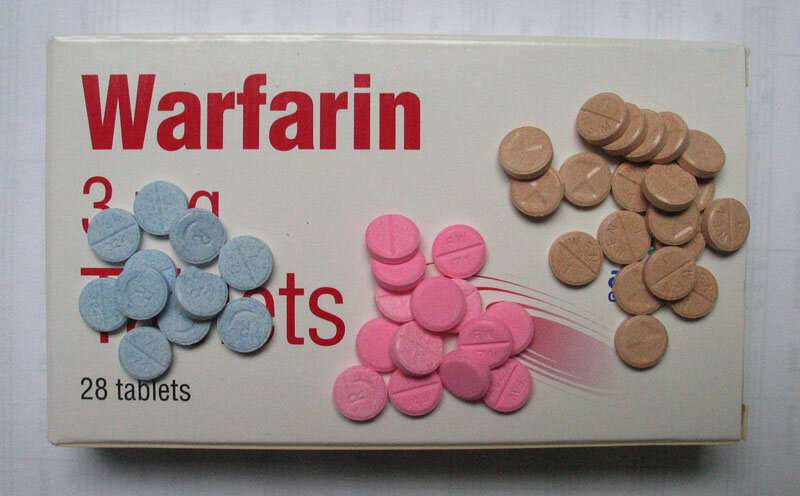This article has been reviewed according to Science X's editorial process and policies. Editors have highlighted the following attributes while ensuring the content's credibility:
fact-checked
peer-reviewed publication
trusted source
proofread
Warfarin use should not disqualify stroke patients from lifesaving clot-removing surgery, says study

Most stroke patients taking the anticoagulant warfarin were no more likely than those not on the medication to experience a brain bleed when undergoing a procedure to remove a blood clot, UT Southwestern Medical Center researchers report in a new study. The findings, published in JAMA, could help doctors better gauge the risk of endovascular thrombectomy (EVT), potentially expanding the pool of eligible patients for this mainstay stroke treatment.
"Warfarin is a type of blood thinner commonly used to prevent stroke because of heart conditions such as atrial fibrillation. Although not very common, patients taking warfarin may still experience a stroke. In clinical practice, it's very possible that some physicians may withhold an endovascular thrombectomy because patients have been treated with warfarin before their strokes.
"Our study could increase the number of patients for whom this lifesaving and function-saving surgery would be appropriate," said study leader Ying Xian, M.D., Ph.D., Associate Professor of Neurology and in the Peter O'Donnell Jr. School of Public Health at UT Southwestern. Dr. Xian is also Section Head of Research, Stroke and Cerebrovascular Diseases in the Department of Neurology at UTSW.
Each year, nearly 800,000 people in the U.S. have a stroke, according to the Centers for Disease Control and Prevention. Most of these strokes are ischemic, meaning that a clot blocks blood flow to a portion of the brain.
EVT—a surgery that removes the clot by threading instruments through the blood vessels—is the most common treatment for acute ischemic stroke. However, Dr. Xian explained, EVTs can sometimes cause symptomatic intracranial hemorrhage (sICH), a dangerous brain bleed that can be fatal. Although warfarin is a known risk factor for bleeding, it's been unknown whether the risk of sICH following EVT is higher for stroke patients who have been on the blood thinner.
To help answer this question, Dr. Xian worked with Eric Peterson, M.D., M.P.H., Professor of Internal Medicine and Vice Provost for Clinical Research at UTSW, along with colleagues from other medical institutions across the country. Together, they gathered data on 32,715 stroke patients who underwent EVT within six hours of stroke symptom onset between 2015 and 2020. Data came from the American Heart Association's Get with the Guidelines-Stroke registry—the largest registry of stroke patients in the world.
The researchers compared a variety of outcomes for the 3,087 patients who took warfarin prior to stroke and the 29,628 patients who did not take any blood thinner. They evaluated whether patients experienced sICH within 36 hours of their EVT procedure, whether they had a serious systemic hemorrhage, or whether they had other complications that required additional medical intervention or an extended hospital stay. Researchers also tracked complications from additional therapies that reintroduced blood flow in the brain, in-hospital deaths, and discharges to hospice care.
After adjusting for differences inherent to patients taking or not taking warfarin, the researchers found no difference in overall risk of sICH or other adverse outcomes in patients in these two groups. However, patients with an international normalized ratio (INR) greater than 1.7—a measure of clotting tendency of blood in patients taking warfarin—the risk of experiencing sICH increased by about 4%.
Whether this effect translates into worse outcomes for patients is unclear, Dr. Peterson said. Except for higher risk of bleeding, these patients with INRs greater than 1.7 were no more likely than those not taking warfarin to die or have worse functional outcomes at discharge.
"Physicians must evaluate stroke patients on a case-by-case basis to determine whether EVT is appropriate, but our study suggests that taking warfarin alone should not necessarily be a limiting factor," he added.
Drs. Xian and Peterson said they are planning to study whether other anticoagulants frequently taken by patients at risk of stroke might increase the risk of sICH or other serious complications following EVT for ischemic stroke.
More information: Brian Mac Grory et al, Recent Vitamin K Antagonist Use and Intracranial Hemorrhage After Endovascular Thrombectomy for Acute Ischemic Stroke, JAMA (2023). DOI: 10.1001/jama.2023.8073



















